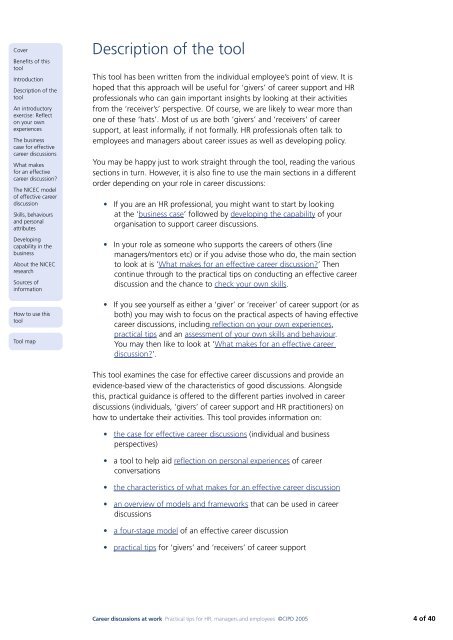Career Discussions at Work, Practical Tips for - CIPD
Career Discussions at Work, Practical Tips for - CIPD
Career Discussions at Work, Practical Tips for - CIPD
You also want an ePaper? Increase the reach of your titles
YUMPU automatically turns print PDFs into web optimized ePapers that Google loves.
Cover<br />
Benefits of this<br />
tool<br />
Introduction<br />
Description of the<br />
tool<br />
An introductory<br />
exercise: Reflect<br />
on your own<br />
experiences<br />
The business<br />
case <strong>for</strong> effective<br />
career discussions<br />
Wh<strong>at</strong> makes<br />
<strong>for</strong> an effective<br />
career discussion<br />
The NICEC model<br />
of effective career<br />
discussion<br />
Skills, behaviours<br />
and personal<br />
<strong>at</strong>tributes<br />
Developing<br />
capability in the<br />
business<br />
About the NICEC<br />
research<br />
Sources of<br />
in<strong>for</strong>m<strong>at</strong>ion<br />
How to use this<br />
tool<br />
Tool map<br />
Description of the tool<br />
This tool has been written from the individual employee’s point of view. It is<br />
hoped th<strong>at</strong> this approach will be useful <strong>for</strong> ‘givers’ of career support and HR<br />
professionals who can gain important insights by looking <strong>at</strong> their activities<br />
from the ‘receiver’s’ perspective. Of course, we are likely to wear more than<br />
one of these ‘h<strong>at</strong>s’. Most of us are both ‘givers’ and ‘receivers’ of career<br />
support, <strong>at</strong> least in<strong>for</strong>mally, if not <strong>for</strong>mally. HR professionals often talk to<br />
employees and managers about career issues as well as developing policy.<br />
You may be happy just to work straight through the tool, reading the various<br />
sections in turn. However, it is also fine to use the main sections in a different<br />
order depending on your role in career discussions:<br />
• If you are an HR professional, you might want to start by looking<br />
<strong>at</strong> the ‘business case’ followed by developing the capability of your<br />
organis<strong>at</strong>ion to support career discussions.<br />
• In your role as someone who supports the careers of others (line<br />
managers/mentors etc) or if you advise those who do, the main section<br />
to look <strong>at</strong> is ‘Wh<strong>at</strong> makes <strong>for</strong> an effective career discussion’ Then<br />
continue through to the practical tips on conducting an effective career<br />
discussion and the chance to check your own skills.<br />
• If you see yourself as either a ‘giver’ or ‘receiver’ of career support (or as<br />
both) you may wish to focus on the practical aspects of having effective<br />
career discussions, including reflection on your own experiences,<br />
practical tips and an assessment of your own skills and behaviour.<br />
You may then like to look <strong>at</strong> ‘Wh<strong>at</strong> makes <strong>for</strong> an effective career<br />
discussion’.<br />
This tool examines the case <strong>for</strong> effective career discussions and provide an<br />
evidence-based view of the characteristics of good discussions. Alongside<br />
this, practical guidance is offered to the different parties involved in career<br />
discussions (individuals, ‘givers’ of career support and HR practitioners) on<br />
how to undertake their activities. This tool provides in<strong>for</strong>m<strong>at</strong>ion on:<br />
• the case <strong>for</strong> effective career discussions (individual and business<br />
perspectives)<br />
• a tool to help aid reflection on personal experiences of career<br />
convers<strong>at</strong>ions<br />
• the characteristics of wh<strong>at</strong> makes <strong>for</strong> an effective career discussion<br />
• an overview of models and frameworks th<strong>at</strong> can be used in career<br />
discussions<br />
• a four-stage model of an effective career discussion<br />
• practical tips <strong>for</strong> ‘givers’ and ‘receivers’ of career support<br />
<strong>Career</strong> discussions <strong>at</strong> work <strong>Practical</strong> tips <strong>for</strong> HR, managers and employees ©<strong>CIPD</strong> 2005<br />
4 of 40

















